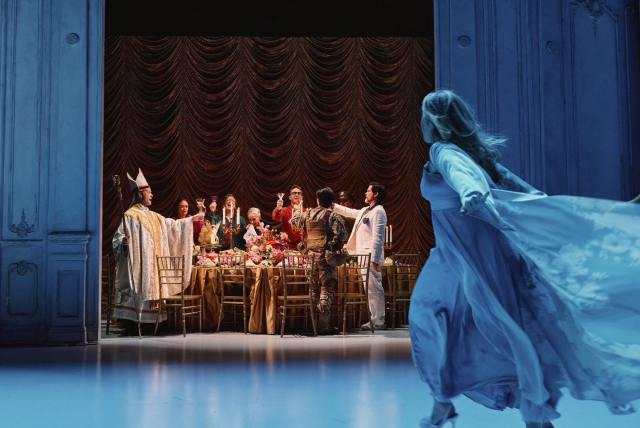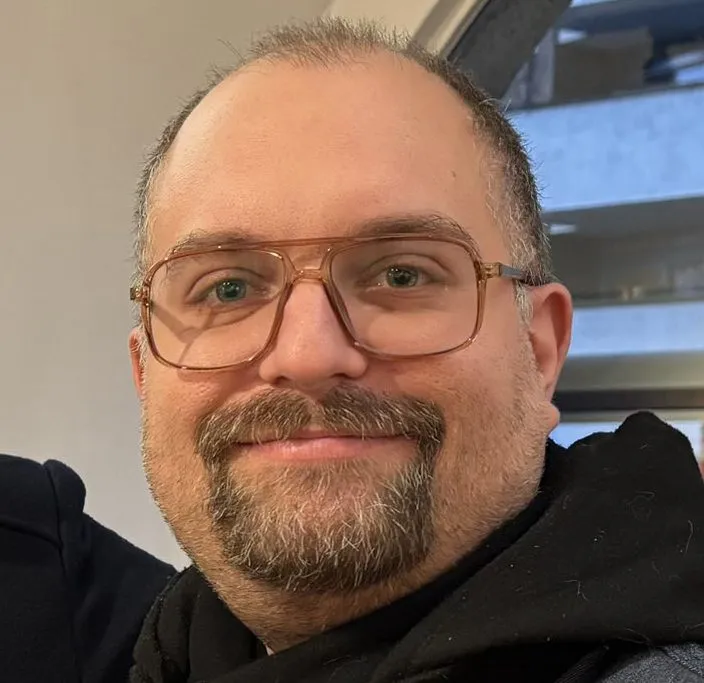Here We Are review – Sondheim’s final musical has its world premiere in New York
The show is based on two films by Luis Buñuel

Stephen Sondheim was a well-known lover of puzzles. The walls of his home were adorned with antique ones, and he spent his career solving them as he uncovered unique ways to make murderous barbers, pointillist painters, and even frogs sing (sometimes in reverse).
Sondheim’s final contribution to the eternal puzzle that is musical theatre is Here We Are, a mashup of two films by Spanish-born surrealist filmmaker Luis Buñuel, created in collaboration with playwright David Ives and director Joe Mantello. Now running at the Shed, Here We Are (previously titled Square One and Buñuel) tosses 1972’s The Discreet Charm of the Bourgeoisie (Act 1) and 1962’s The Exterminating Angel (Act 2) into a blender. While it doesn’t quite reach the heights of Sondheim’s canonical masterpieces, it is a delightful and emotional conclusion to the nonagenarian songwriter’s résumé, filled with the kind of reflections that you’d expect from someone who knows that the end is nigh.
Having said that, those expecting a full Stephen Sondheim musical may be disappointed. Depending on how you look at it, it’s either frustratingly unfinished, or a contemporary example of the genre-busting concept theatre that Sondheim ushered in with Company. But with this cast, production team, and the final songs that Sondheim ever wrote, it’s the closest thing we’ve had to a historic theatrical event in a very long time, and it’s well worth the ticket price, if you have the dough.
These characters have that kind of money; after all, Here We Are is a tragicomedy about the haves and the have-nots. In Act 1, we meet a posh group of friends in search of a meal. Plastic surgeon Paul (Jeremy Shamos, who gets the single funniest line), his talent-agent wife Claudia (Amber Gray), and their ambassador pal Raffi (Steven Pasquale) arrive on the doorstep of Leo (Bobby Cannavale) and his dippy wife Marianne (Rachel Bay Jones) thinking they have brunch plans. So off they go, with Marianne’s genderqueer socialist sibling Fritz (the always excellent Micaela Diamond) in tow, to a series of restaurants with increasingly bizarre problems, the least of which is having no food.
Eventually, Raffi invites them to his residence, where, joined by a Bishop (David Hyde Pierce, utilizing his career-honed deadpan to great effect) who wants a new job, an army Colonel (Francois Battiste) hunting a drug cartel, a soldier (the romantic Jin Ha) smitten with Fritz, and two creepy servants (Denis O’Hare and Tracie Bennett), they finally share a meal … only to realize, as Act 2 begins, that they’re trapped. With mysterious gunshots in the distance (or are cars just backfiring?), perhaps Fritz is onto something when they say that it’s the end of the world.
The first act is the more complete of the two, with songs interwoven throughout. Even in his late 80s, Sondheim was playing with form — the core five friends mostly sing together as a group, and the eccentrics they meet along the way get the big numbers. It all goes to hell in the second act as the characters find themselves in an increasing state of panic, sans food, water, the ability to go home, or the ability to sing.
It’s become known of late that Sondheim couldn’t figure out how to crack the concept of musicalising The Exterminating Angel, and besides some recitative and a lovely solo for Marianne at the top, the last 45 minutes of the show are essentially a darkly comic David Ives play (orchestrator Jonathan Tunick and music supervisor and arranger Alexander Gemignani do provide copious underscoring). Ives gleefully tortures the poor rich souls at length, ultimately offering more explanation for their entrapment than is dramatically necessary, given the world that he and Sondheim set up from the start. We get that the wealthy are oblivious to the plight of the working class; hammering us with the idea is not very Buñuelian at all.
But Mantello’s direction is impeccable. With a cast of scene-stealers like this, you’d expect everyone to vie for the limelight, yet they all come together effortlessly as an ensemble. Even so, Jones — a free spirit in a negligee (David Zinn’s costumes are as transformative as his shape-shifting set and Natasha Katz’s ominous lighting) — is the heart of the piece, bringing sincerity to a series of increasingly flighty one-liners and sharing a glorious scene with Pierce and a pair of fuzzy slippers, while O’Hare gets one of Sondheim’s cleverest bits of wordplay ever as the waiter in the restaurant with no food. “We do expect a little latte later,” he sings with elation, “but we haven’t got a lotta latte now.” His delivery pushes it over the edge from merely wonderful to sheer musical-theatre ecstasy.
At the start of The Exterminating Angel, Buñuel provides a title card that reads “The best explanation of this film is that, from the standpoint of pure reason, there is no explanation.” The same can be said of Here We Are. Once you go with the flow, you won’t care that one character is carrying a stuffed sheep through the audience, and another is dancing with a giant bear. It’s a surrealist puzzle that Sondheim and Ives clearly enjoyed trying to solve — and we’d be hard-pressed not to enjoy it ourselves.















